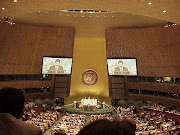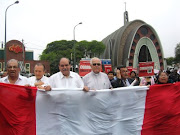10 octubre, 2010
Discurso del Presidente Moreno ante conferencia G30 (texto en inglés)
El presidente del Banco Interamericano de Desarrollo Luis Alberto Moreno habló hoy sobre las perspectivas y los desafíos de las economías de América Latina y el Caribe en un seminario G30 de la Banca Internacional, en Washington, D.C. El BID actuó como anfitrión para el evento, que ocurrió en el marco de la reunión anual del Fondo Monetario Internacional y el Grupo Banco Mundial.
Remarks by President Luis Alberto Moreno at the G30 International Banking Seminar Sunday, October 10, 2010 As prepared for delivery LATIN AMERICA IN THE GLOBAL CONTEXT In the current complex global environment, which was presented so lucidly in the previous section, conditions in Latin America are comparatively favorable. Undoubtedly, the region coped successfully with the world financial crisis; the growth forecast is stronger than for the developed economies; financial, monetary, and fiscal institutions are much sounder than two decades ago; the natural resources in demand around the world are abundant in our region; and social policy mechanisms are more efficient. The majority of countries now have independent Central Banks committed to price stability, with solid international reserve positions in almost all countries, and fiscal institutions with pre-established objectives and rules. It is important to remember that sound macro institutions are both technical and political achievements. After decades of macroeconomic imbalances, broad political and social consensus has been built around price stability and the need for responsible fiscal policies. Without jeopardizing medium-term macro sustainability, and on account of better institutions, during the past decade several countries have already overcome three central problems: vulnerability to sudden stops in external financing, the inability to issue debt in local currency, and pro-cyclical fiscal policy, triggered, in part, by the first two problems. Sound financial systems are additional great strengths of the region, as reflected in regulatory capital requirements, the moderate leverage ratios of bank balances, the modest levels of non-performing assets in bank portfolios, the high provision and reserve rates, and high returns. There is awareness in the region of the importance of remaining vigilant to protect the system, and of the importance of promoting greater competition for further credit deepening. It is important to emphasize, however, that the region is also very heterogeneous. A very good example of this variety is the unequal way that the countries are affected by the current abundance of capital and high commodity prices. In countries like Brazil, Chile, Colombia, and Peru that have flexible exchange rates and sound macroeconomic balances, there is strong upward pressure on currencies, making it a great challenge to stay competitive. In these countries, the recovery has been clearly V-shaped, and in some there are even signs that the GDP is approaching its potential level. In the Central American and Caribbean countries, the majority of which are net importers of commodities and receive significant external revenue from remittances or tourism, both depressed by the crisis, the recovery has been slower. Although capital flows to the smaller economies have increased in recent months, they have been relatively moderate and more unstable than those of the region’s larger economies. As a matter of fact, one of the risks faced by the region in the short term, which is a topic of this forum, is the risk related to capital movements. Strong inflows of capital in countries that are more financially integrated with the rest of the world exacerbate the trade-off between monetary autonomy and exchange rate stability. So far, the countries with flexible exchange rates have safeguarded their monetary autonomy, which has prompted them to accept strong exchange rate appreciation. This strategy is not without risks, since price bubbles can emerge on the stock or real estate markets and can lead financial intermediaries to take excessive risks. Furthermore, instability of exchange rates may jeopardize investment decisions and diversification in tradable goods sectors. Until now, measures to directly limit capital inflows have been the exception, although some countries have imposed taxes to short term capital inflows or established marginal reserve requirements to foreign liabilities in the banking sector. Measures to counteract the loss of competitiveness in tradable goods sectors, such as import duties, export subsidies, and other restrictions on international trade, have also been few and far between. But further currency appreciation will intensify political pressures for greater intervention. Setting aside monetary, financial, and exchange-rate issues for a moment, great strides have also been made on the social front. New political and social institutions have improved the governments’ capacity to support human capital development and to offer social safety nets for low-income families. Although Latin America has traditionally had the widest social inequalities of any region in the world, that range has narrowed in the last decade in most of the countries, thanks to efforts to increase and target social spending for low-income families. Looking ahead The medium-term outlook for Latin America is very promising. While acknowledging the diversity of economic and political conditions from country to country, one can say that Latin America and the Caribbean is the emerging region best prepared to benefit from the decade ahead. The majority of our economies are opening to the globalized world, supported by sustainable macroeconomic management and responsible fiscal, monetary, and social policies. One of the main challenges for the region is to complement these gains with increases in productivity that ensure quality jobs and sustained and sustainable growth. While acknowledging that the region faces many other challenges, I would like to take these last few minutes to discuss two that I consider very important and relevant to this part of the forum. The first challenge is to raise productivity. As the IDB noted in a recent publication, the income gaps between the developed world and Latin America and the Caribbean have widened in recent decades because of the widening gap in productivity, not because of the lack of investment. When we speak of productivity, we think almost automatically about the industrial sectors and the competitiveness of the tradable goods sectors. But in the region, productivity problems are particularly severe in the services sector. While there have been marked productivity gains in industry, and particularly in agriculture in the past 20 years, the productivity of the services sector has tended to decrease. Since services account for nearly two-thirds of jobs, it would be impossible to raise aggregate productivity without concentrating on this sector. This becomes more acute in the current context of relatively abundant foreign exchange, when the obstacle to growth is not the tradable goods sector, but the services sector. The low productivity of services is closely linked to another major problem: the problem of informal labor and the reduced size of businesses and productive units in the services sector. Unfortunately, well-intentioned policies tend to reinforce informality and the survival of firms with low productivity. To protect workers, labor regimes in Latin America establish very high taxes and contributions for formal-sector employment, and simplified regimes or total tax exemption for the informal sector. Ironically, some of the taxes and contributions are used to subsidize social services for informal workers, creating a vicious circle of higher taxes on formal employment, increasing informality, and decreasing productivity. In order to be productive and competitive, the region must, among other things, take on the reform of its labor markets and their underlying tax regimes. The other challenge is to ensure that income from natural resources is used more effectively. As I mentioned earlier, institutions are better prepared to manage income from natural resources in a way that does not cause macroeconomic instability. But there is more to it than that. There are three priority areas where income from natural resources should be invested: (1) to finance investments to close the productive and social infrastructure gaps; (2) to cover current and future deficits in social security systems so that deficits do not become an increasing burden for the formal-sector workforce, and by this means reducing informality; and (3) to save for future generations, particularly when that income would otherwise come from nonrenewable resources. Today there are, then, great challenges and great opportunities in the region. That is why I consider, as do other analysts, that “if the region rises to the challenges, we stand poised to make this the decade of Latin America and the Caribbean.” Thank you. |

















No comments:
Post a Comment